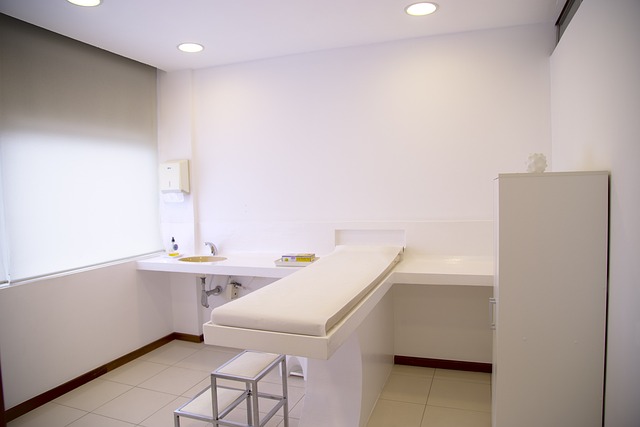In the diverse UK healthcare setting, effective communication is paramount. Translation services play a crucial role in bridging language gaps for patients from various linguistic backgrounds, ensuring they understand their treatment plans. Accurate translations improve patient care, outcomes, and trust, while mitigating legal risks. These services are essential for fulfilling legal obligations, respecting privacy, and facilitating informed consent. Integrating professional translation services for physician's treatment plans UK ensures precise, culturally sensitive communications, enhancing patient safety and satisfaction. Real-world examples demonstrate improved adherence, engagement, and reduced errors when implementing these services. With AI and ML technologies advancing, the future holds promise for even more efficient and inclusive healthcare delivery through streamlined medical translations.
In today’s diverse healthcare landscape, ensuring language accessibility is paramount. With the UK hosting a growing multilingual population, it’s crucial for physicians to consider translation as an integral part of treatment planning. This article explores the significance of language accessibility in healthcare, challenges in serving a multicultural demographic, and the vital role of translation services in enhancing patient safety and communication. We also delve into legal considerations, selection of reliable providers, best practices, successful case studies, and future trends shaped by technology, all focused on optimizing physician’s treatment plans with UK-ready translation services.
- Understanding the Importance of Language Accessibility in Healthcare
- Challenges of Providing Medical Care to a Multilingual Population
- The Role of Translation Services in Ensuring Patient Safety and Effective Communication
- Legal and Ethical Considerations for Physician's Treatment Plans in the UK
- Selecting Reliable and Accurate Translation Providers for Medical Documentation
- Best Practices for Integrating Translation into Healthcare Settings
- Case Studies: Successful Implementation of Translation Services in UK Healthcare
- Future Trends: Technology Advancing Medical Translation and Patient Care
Understanding the Importance of Language Accessibility in Healthcare

In today’s diverse healthcare landscape, ensuring language accessibility is paramount to delivering quality patient care. The UK, with its multicultural population, demands that medical professionals adapt their treatment plans to cater to patients from various linguistic backgrounds. When it comes to physicians creating treatment plans, translation services play a pivotal role in making these documents accessible and effective.
Accurate translation ensures that patients fully comprehend their diagnosis, treatment options, and aftercare instructions, empowering them to actively participate in their healthcare. This is particularly crucial for non-native English speakers who may face communication barriers, leading to potential misunderstandings and misalignments in treatment expectations. By integrating translation services into physician’s treatment plans UK-wide, healthcare providers can bridge this language gap, fostering better patient outcomes and enhancing overall care quality.
Challenges of Providing Medical Care to a Multilingual Population

Providing medical care to a multilingual population presents unique challenges, especially when it comes to ensuring effective communication and treatment plans tailored to each patient’s linguistic needs. In the UK, where a significant portion of the population speaks languages other than English, healthcare providers must be prepared to offer translation services for physician’s treatment plans. This is crucial to avoid miscommunication that could impact patient care, trust, and even legal repercussions.
Translation services play a vital role in bridging this gap, enabling healthcare professionals to discuss diagnoses, treatments, and follow-up instructions accurately. With the right translation support, patients from diverse linguistic backgrounds can actively participate in their care, making informed decisions and adhering to treatment regimens more effectively. This not only improves patient outcomes but also fosters better relationships between healthcare providers and a diverse range of UK residents.
The Role of Translation Services in Ensuring Patient Safety and Effective Communication

In the healthcare sector, effective communication is paramount, especially when it comes to patient care and treatment plans. For physicians considering providing services in the UK, ensuring that treatment plans are accessible and understandable for patients from diverse linguistic backgrounds is crucial. This is where translation services play a vital role.
Professional translation ensures that medical terminology and complex instructions are accurately conveyed to patients who may not speak English as their first language. It helps avoid potential risks associated with miscommunication, such as incorrect medication dosages or misunderstandings about treatment procedures. By offering translated treatment plans, healthcare providers can foster better patient safety, improve adherence to prescribed treatments, and enhance overall satisfaction among a diverse patient population in the UK.
Legal and Ethical Considerations for Physician's Treatment Plans in the UK

When physicians create treatment plans, especially for international patients in the UK, ensuring comprehensive and accurate communication is paramount. Legal and ethical considerations play a crucial role in this process. The UK’s healthcare system demands that medical professionals provide clear, accessible information to patients, respecting their autonomy and right to informed consent. This includes translating treatment plans into relevant languages, addressing cultural nuances, and adhering to data protection laws for patient confidentiality.
Translation services for physician’s treatment plans are essential to meet these requirements. Professional translation ensures that medical jargon is accurately conveyed, reducing potential misunderstandings. It also facilitates a seamless patient-doctor interaction, fostering trust and ensuring the patient fully comprehends their treatment options and responsibilities.
Selecting Reliable and Accurate Translation Providers for Medical Documentation

When preparing medical documentation for the UK market, selecting reliable and accurate translation providers is paramount to ensure patient safety and compliance with regulatory standards. Physician’s treatment plans, being critical components of healthcare delivery, demand precise translations that capture all nuances and medical terminology accurately. This is not just about converting words from one language to another; it involves conveying complex medical concepts while maintaining the integrity of the original plan.
Choosing reputable translation services specialized in medical documentation for the UK ensures adherence to industry best practices. These providers often employ qualified translators with extensive medical knowledge, enabling them to handle terminological and conceptual challenges effectively. Look for companies that offer quality assurance processes, including peer review and editing, to guarantee error-free translations. Additionally, their ability to adapt to specific medical terminology and local clinical guidelines ensures your treatment plans are tailored to the UK healthcare context.
Best Practices for Integrating Translation into Healthcare Settings

In healthcare, effective communication is paramount, especially when it comes to treatment plans. Integrating translation services into physician practices in the UK is a best practice that ensures patient safety and satisfaction. When treating patients from diverse linguistic backgrounds, having their treatment plans accurately translated into their native language is crucial. This simple step can prevent misunderstandings, improve adherence to medical advice, and foster trust between healthcare providers and patients.
Healthcare professionals should consider using professional translation services for physician’s treatment plans UK. These services employ skilled linguists who are well-versed in medical terminology, ensuring precise and culturally sensitive translations. With the right translation approach, healthcare providers can offer personalized care that bridges language barriers, ultimately leading to better health outcomes.
Case Studies: Successful Implementation of Translation Services in UK Healthcare

In recent years, there has been a growing recognition of the importance of translation services within the UK healthcare sector. Numerous case studies highlight successful implementations where professional translation played a pivotal role in enhancing patient care and improving clinical outcomes. For instance, a study focusing on a major London hospital revealed that integrating translation services into physician’s treatment plans led to increased patient satisfaction and improved adherence to medication regimens among non-English speaking individuals.
Another compelling example involves a regional NHS trust which adopted translation solutions for patient education materials and consent forms. This initiative resulted in reduced medical errors, better understanding of procedures, and higher levels of patient engagement. These real-world applications underscore the value of translation services in ensuring equitable access to healthcare, particularly within a multicultural society like the UK, where effective communication is essential for successful treatment plans.
Future Trends: Technology Advancing Medical Translation and Patient Care

The future of medical translation is poised for significant advancements, thanks to rapidly evolving technology that promises to revolutionize patient care in the UK. Artificial Intelligence (AI) and Machine Learning (ML) are at the forefront of this transformation, enabling real-time and highly accurate translations of physician’s treatment plans and medical records. These technologies can facilitate seamless communication between healthcare professionals from diverse linguistic backgrounds, ensuring that every patient receives care tailored to their specific needs without language barriers.
As we move forward, integration of advanced translation services into the UK healthcare system will become increasingly vital. By leveraging AI and ML, healthcare providers can streamline processes like document translation, interpretation services, and even personalized medication instructions, enhancing patient safety and satisfaction. This trend not only promises improved accessibility for multicultural patients but also paves the way for more efficient, effective, and inclusive healthcare delivery across the board.
In today’s diverse healthcare landscape, ensuring language accessibility through translation services is no longer an option but a necessity. As the UK’s multilingual population continues to grow, it’s crucial for physicians to have their treatment plans translated accurately and reliably. This not only facilitates effective communication with patients but also safeguards their safety and ensures compliance with legal and ethical standards. By adopting best practices and leveraging technological advancements in medical translation, healthcare providers can deliver exceptional care to all patients, fostering inclusivity and improving overall health outcomes. Translation services for Physician’s Treatment Plans UK are an essential component of a modern, patient-centric healthcare system.
